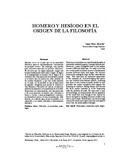Mostrar el registro sencillo del ítem
Homero y Hesíodo en el origen de la Filosofía
| dc.rights.license | http://creativecommons.org/licenses/by-nc-sa/3.0/ve/ | |
| dc.contributor.author | López Pérez, Ricardo | |
| dc.date.accessioned | 2012-06-14T19:59:33Z | |
| dc.date.available | 2012-06-14T19:59:33Z | |
| dc.date.issued | 2012-06-30 | |
| dc.identifier.issn | 0798-1570 / Electrónico: 2244-8438 | |
| dc.identifier.uri | http://www.saber.ula.ve/handle/123456789/35392 | |
| dc.description.abstract | Muchas veces se acepta que la racionalidad fi losófi ca aparece repentinamente clausurando un período oscuro. Sin embargo, una mirada más reflexiva muestra un paisaje diferente. Es efectivo que en algún momento surgió una tensión fundamental entre mito y logos: la lógica de la ambigüedad en tensión con la lógica de la contradicción. Una oposición insostenible cuando se reconoce que los poetas no están aislados de los asuntos humanos; y que hay razón también en el mito, en la medida en que proporciona las grandes categorías para pensar la existencia. Con Homero y Hesíodo a la cabeza, el mito nos enfrenta inicialmente con el problema de la verdad. Representa un conocimiento, una interpretación y un acercamiento al mundo, que teniendo a dioses y héroes como protagonistas centrales, no desembocó nunca en una sacralización. Más todavía, su evidente aprecio por la palabra y su expresión, a su modo, anticipan el pensamiento fi losófi co. Palabras clave: Filosofía, racionalidad, mito, logos. | es_VE |
| dc.language.iso | es | es_VE |
| dc.rights | info:eu-repo/semantics/openAccess | |
| dc.subject | Filosofía | es_VE |
| dc.subject | Racionalidad | es_VE |
| dc.subject | Mito | es_VE |
| dc.subject | Logos | es_VE |
| dc.title | Homero y Hesíodo en el origen de la Filosofía | es_VE |
| dc.title.alternative | Homer and Hesiod at the Origin of Philosophy | es_VE |
| dc.type | info:eu-repo/semantics/article | |
| dc.description.abstract1 | It has been several times accepted that philosophical rationality suddenly appears closing a dark period. However, a more thoughtful look at this matter reveals a different landscape. It is quite a true that at a certain point in history it arose a fundamental tension between myth and logos; the tension between the ambiguity logic and the contradiction logic. This represents an untenable opposition at the moment of; acknowledging that poets are not isolated from human matters; knowing that there is also reason in myths insofar as this provides the major categories that support the thinking of existence. Being Homer and Hesiod the fi rsts, myths confront us at the beginning with the problem of truth. He represents a type of knowledge, an interpretation and an approach of the world that even though it was starred by heroes and gods as leading characters it didn’t run into a consecration. Furthermore, his obvious high esteem for words and expressions has anticipated in his way, the philosophical thought. Key words: Philosophy, rationality, myth, logos. | es_VE |
| dc.description.colacion | 5-22 | es_VE |
| dc.description.email | rlopezp@med.uchile.cl | es_VE |
| dc.description.frecuencia | semestral | |
| dc.identifier.depositolegal | PP92-0047 | |
| dc.identifier.depositolegal | PP92-0047 | |
| dc.publisher.pais | Venezuela | es_VE |
| dc.subject.centroinvestigacion | Centro de Investigaciones Literarias y Lingüísticas Mario Briceño Iragorry | |
| dc.subject.centroinvestigacion | Centro de Investigaciones Literarias y Lingüísticas Mario Briceño Iragorry | |
| dc.subject.facultad | Núcleo Rafael Rangel (NURR) | es_VE |
| dc.subject.keywords | Philosophy | es_VE |
| dc.subject.keywords | Rationality | es_VE |
| dc.subject.keywords | Myths | es_VE |
| dc.subject.keywords | Logos | es_VE |
| dc.subject.publicacionelectronica | Revista Cifra Nueva | |
| dc.subject.seccion | Cifra Nueva: Estudios | es_VE |
| dc.subject.thematiccategory | Artes y Humanidades | es_VE |
| dc.subject.tipo | Revistas | es_VE |
| dc.type.media | Texto | es_VE |
Ficheros en el ítem
Este ítem aparece en la(s) siguiente(s) colección(ones)
-
Cifra Nueva - Nº 025
Enero - Junio 2012


